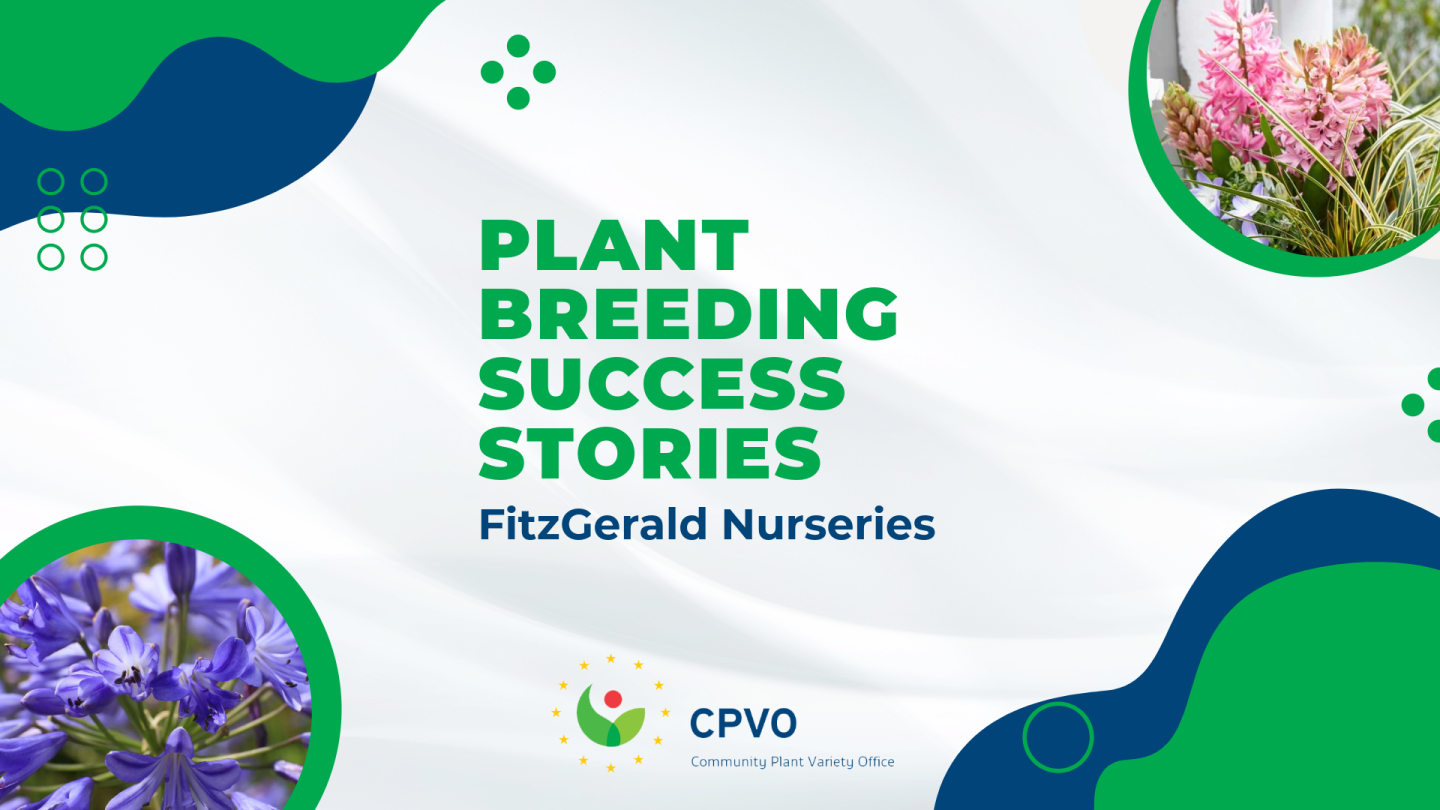
Welcome back to our 'Plant Breeding Success Stories', where we share interviews from SMEs across the Plant Breeding sector. In this article, we're chatting with FitzGerald Nurseries, an Irish company based in Stonyford, Kilkenny.
CPVO: Could you briefly describe the work of FitzGerald Nurseries?
FitzGerald Nurseries: Our operations are built on the foundation of registering and representing intellectual property (IP) to carve out an innovative niche in various crops, which are now produced on an unprecedented scale in Europe. FitzGerald Nurseries focuses on ornamental plants, Beotanics specializes in various vegetable crops and technology, and Nativaland is dedicated to sweetpotato cultivation through a joint venture.
Beotanics, originally known as Garraith when founded in 1999, was created to separate IP revenue from primary production, a crucial step for our family farm. My wife Noirin and I own Beotanics Ltd. entirely, and we decided to mitigate risks for FitzGerald Nurseries and our laboratory, BeoLab. In 2014, our R&D and breeding initiatives evolved, leading to vertical integration. Beotanics Ltd. reinvests royalties from our plant varieties, funding our nursery and laboratory, and enabling us to sell our EverColor® varieties, such as Carex Everillo and Carex Everest, across Europe, Japan, and the USA.

We extended this strategy to sweetpotato, partnering with a company in Portugal to share risks. We established Nativaland Ireland for variety royalty collection, Nativaland Portugal for producing planting materials, and NativaBio for organic sweetpotato production in Portugal. All Nativaland entities operate under a strategy of using protected varieties licensed from Louisiana State University AgCenter.
Our approach involves multiple focused teams managing different crops under a unified strategy. We're now expanding into Wasabi, creating a new entity to protect these varieties with CPVO. Through the Beotanics model, our sub-companies have evolved strategically since 2015, leveraging our accumulated knowledge of plant intellectual property rights to monetize innovations effectively within an SME framework. I describe our approach as “many hands make light work” rather than “too many cooks spoil the broth.”
CPVO: You are a joint Irish-Portuguese establishment . What are the pros, and the cons of this situation?
FitzGerald Nurseries: There are definite advantages to our joint Irish-Portuguese setup. For a farm-based SME like ours, sharing risks across two countries is beneficial. We gain diverse management skills and perspectives, which enriches our approach. During tough times, being able to share the burden helps manage human resource stress effectively. Additionally, combining local knowledge and networks from both countries creates good synergy when managed well. Each country brings unique strengths, such as agronomic practices, service locations, cost structures, innovation perspectives, and life experiences, all of which add value to our operations.
However, there are challenges too. Managing human relationships across different cultures takes effort, but these challenges can be turned into strengths. Operating in two different countries and cultures requires a lot of work, but it builds character. The geographic distance presents travel challenges, which were particularly difficult during the COVID pandemic.
Overall, with honesty and forthright behavior, we find that the positives can significantly outweigh the negatives.
CPVO: How is your organization adapting to environmental challenges brought about by climate change?
FitzGerald Nurseries: At Nativaland, we are deeply invested in learning and managing various weather conditions. We study sweet potato cultivation across different climates worldwide, which is a significant but often unseen commitment of resources. This year, we made a substantial investment in new environmental control chambers to allow early harvests, crucial as autumns become increasingly wet. This ensures that our propagation seed roots remain resilient and productive. We're also focused on improving soil quality across all our production areas. Our footprint in fertilizer, chemical, and energy usage is already very low, particularly in the production fields, but we are continually striving to reduce it further. Currently, adding value to waste is a major project for us.
For Beotanics and FitzGerald, we've recently invested €1 million in a new propagation greenhouse equipped with insect protection and a high-quality ebb and flood water recirculation system. This system ensures 100% recirculation and treatment through ultrafiltration, significantly reducing fertilizer, chemical, and water usage. We're also targeting advanced technologies and genetics in climate-resilient crops through participation in two EU Horizon 2020 projects: Smart Protein and Valpro Path. Additionally, we've established an Irish-centric potato minituber production program to provide local clean seed to the Irish potato industry, similar to what we do for sweetpotato across Europe. Other projects, such as energy production for our sites, are currently in preliminary financial planning. Our goal is to eventually supply our own on-farm energy, pending advancements in battery technology and grid feed-in capabilities.

CPVO: Can you elaborate on the significance of biodiversity for the future of plant genetics and the role of the Community Plant Variety Office (CPVO) in safeguarding it?
FitzGerald Nurseries: At Beotanics, we are currently working on nine different crops, three of which we believe will significantly address biodiversity issues. While we need to keep the specifics of our research private, it's worth noting that some of these crops are native to Europe, and others come from different parts of the world. We have a strategic modeling approach to our research. Without the protection provided by the CPVO, as a very small company, we wouldn't be able to safeguard our work when releasing improved varieties. This protection is crucial as it allows us to monetize our unique market positions to some degree, ensuring that our innovations are not easily replicated by larger competitors.
CPVO: What challenges do SMEs face in the absence of Plant Variety Rights (PVRs), and what influenced your decision to opt for this system?
FitzGerald Nurseries: Nativaland benefits from the experience and breeder networks of Beotanics. For Beotanics, PVRs are central to our value chain and business model, offering hope of monetizing open varieties and providing protection against copycats. Without PVRs, investments in breeding and production optimization would be at risk.
The second part of this interview can be found here.
